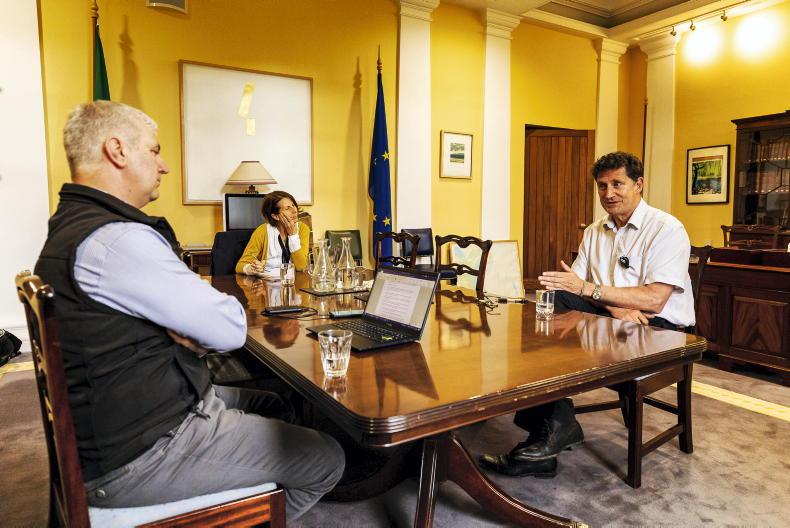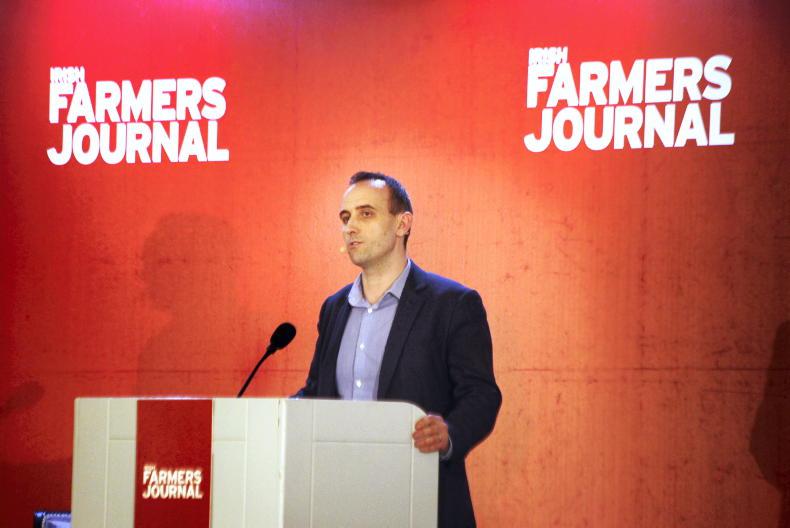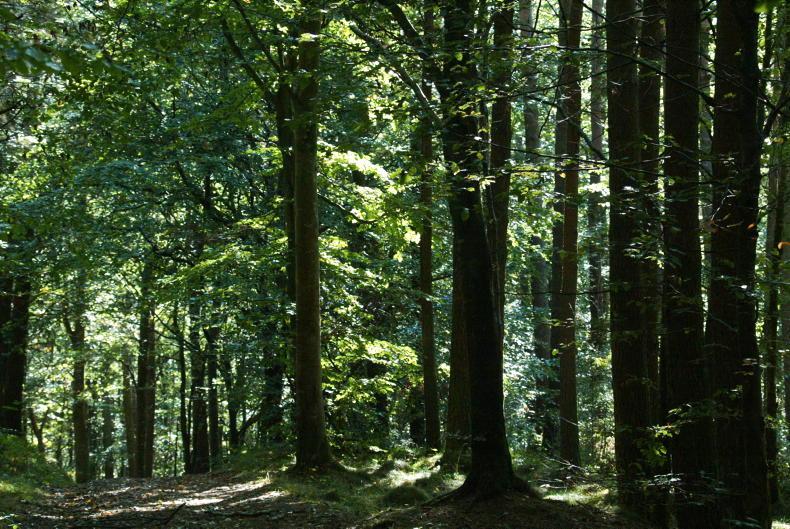Farmers, and all other sectors of the economy, will have to “go to the max” when it comes to their carbon reduction targets, Minister for the Environment, Climate and Communications Eamon Ryan has said.
In an exclusive interview with the Irish Farmers Journal he said farmers “shouldn’t be the fall guys” if all sectors miss their targets.
“No sector gets an opt-out, but no sector on the other side will be the fall guys or the people that get all the blame,” he said.
Ministers and their departments will have to “adjust policies” if targets are not being delivered, he said, reiterating that there will be fines for Ireland if targets are missed.
“The time for us not meeting targets is over. The rubber is hitting the road now on all these issues and every sector is going to have to really move forward.”

Minister Eamon Ryan interviewed by Pat O’Toole in his ministerial office in Leinster House. \ Philip Doyle
He added that data centres are going to have to live within their targets too. “No one should be unduly blamed, least of all farmers, and I think we won’t make the change unless it’s to a better system.”
None of the sectoral targets have been finalised yet, he said.
The Green Party leader said there is “real potential” in carbon being an income stream for farmers and for a premium for low-carbon beef and sheepmeat.
“What’s interesting in a lot of these new income streams they, particularly in my mind, go to areas of the country, and those parts of the farming sector, that have been least well paid.
“If you look at where farming incomes are really low, in suckler, sheep sectors, in more marginal lands – they’ve had the worst output in terms of income,” he said. On rewetting, he said there would still be a role for cattle and sheep on these lands.
“Typically what you’d do is you’d rewet it [in the] winter period; [it’s] pretty much soaked, [then in the] summer period; the water table drops, bring the cattle and sheep in to graze,” he said.
“If we can’t sell that sheep or cattle supply as a low-carbon solution form of grazing cattle or sheep, well then we’re not going to do our job. The same way we get a premium for Kerrygold, I’m absolutely convinced we could get a premium for cattle and sheep grazing peaty soils in this sustainable way.
“Not only are you getting the income for the storage of the carbon, you’re getting a better premium for the meat product coming out of it.”
Minister Ryan ruled out nuclear energy in Ireland, stating it’s not an option here. “I just don’t see nuclear coming because it’s so expensive but what is coming for certain is renewable energy at scale on the farm.”
He said nuclear is “not really relevant to Ireland” because “we don’t have any expertise, it’s really expensive, it’s not here and now”.
“But anaerobic digestion is, solar is and that’s going to come at massive scale in my mind.” He believes that anaerobic digestion can be a serious part of meeting our energy needs.
Despite scientific consensus that the CO2 equivalent model grossly overestimates agriculture’s impact on global warming where methane levels are stabilised, Minister Ryan does not appear to be for turning. He said the science is clear and certain on the topic.
“Methane released into the atmosphere goes up to the upper atmosphere, it oxidises there it doesn’t disappear, it actually converts into carbon dioxide and it has a very strong greenhouse gas heating effect. The science in the UN framework [and] the IPCC are absolutely categorical: this is an issue, it has to be developed, it can’t be ignored, the science is real and frightening and urgent action is needed. How exactly you apply the urgent action is where you get variations and that’s where a lot of the science will be played out in terms of ‘what does that mean, what do we do’. It is complex,” he said.
On the contentious issue of forestry, a sector currently beleaguered by licensing issues, Minister Ryan admitted that where the country’s forests have been planted are in the wrong places.
“What we have found is where we put the forests in the first place were in the wrong place. We put them up on peaty soils and that drains the soils. There’s also problems up there in terms of wind blow and other difficulties. What farmers don’t want to do is give up the farm. It’s an important part of culture, identity and the future. Sometimes if you say we’re going to cover the whole thing in forests and you can’t touch it for generations, they’re nervous around that.”
Wagging the finger
The minister said that what farmers don’t want “is people wagging their finger at them and being holier than thou”.
He said Ireland can and will be ahead of the leap in terms of climate.
“I think Irish farmers know that and the Irish rural community know that. It’s a matter of making it practical and feasible to do it and that’s my job. Giving out won’t get us anywhere.”
Gene editing
Minister Ryan said that he “wouldn’t rule out” gene editing but that he needs more advice on it.
On the Dutch situation
“The Dutch farming system … they’ve gone the whole hog, literally. And they have to reverse back because they’ve destroyed their natural systems and we haven’t.”
Diversification
“Are there other income streams which allow us to meet our climate targets and give a diversification of income to Irish farming? I think that’s the key issue.”
Supply chains
“One of the things coming out of COVID and one of the things coming out of the Ukrainian war is a certain questioning of those long supply chains and just shipping everything in.
Tillage
“For our own food security we need to start restoring, particularly horticulture, tillage.”
Farmers, and all other sectors of the economy, will have to “go to the max” when it comes to their carbon reduction targets, Minister for the Environment, Climate and Communications Eamon Ryan has said.
In an exclusive interview with the Irish Farmers Journal he said farmers “shouldn’t be the fall guys” if all sectors miss their targets.
“No sector gets an opt-out, but no sector on the other side will be the fall guys or the people that get all the blame,” he said.
Ministers and their departments will have to “adjust policies” if targets are not being delivered, he said, reiterating that there will be fines for Ireland if targets are missed.
“The time for us not meeting targets is over. The rubber is hitting the road now on all these issues and every sector is going to have to really move forward.”

Minister Eamon Ryan interviewed by Pat O’Toole in his ministerial office in Leinster House. \ Philip Doyle
He added that data centres are going to have to live within their targets too. “No one should be unduly blamed, least of all farmers, and I think we won’t make the change unless it’s to a better system.”
None of the sectoral targets have been finalised yet, he said.
The Green Party leader said there is “real potential” in carbon being an income stream for farmers and for a premium for low-carbon beef and sheepmeat.
“What’s interesting in a lot of these new income streams they, particularly in my mind, go to areas of the country, and those parts of the farming sector, that have been least well paid.
“If you look at where farming incomes are really low, in suckler, sheep sectors, in more marginal lands – they’ve had the worst output in terms of income,” he said. On rewetting, he said there would still be a role for cattle and sheep on these lands.
“Typically what you’d do is you’d rewet it [in the] winter period; [it’s] pretty much soaked, [then in the] summer period; the water table drops, bring the cattle and sheep in to graze,” he said.
“If we can’t sell that sheep or cattle supply as a low-carbon solution form of grazing cattle or sheep, well then we’re not going to do our job. The same way we get a premium for Kerrygold, I’m absolutely convinced we could get a premium for cattle and sheep grazing peaty soils in this sustainable way.
“Not only are you getting the income for the storage of the carbon, you’re getting a better premium for the meat product coming out of it.”
Minister Ryan ruled out nuclear energy in Ireland, stating it’s not an option here. “I just don’t see nuclear coming because it’s so expensive but what is coming for certain is renewable energy at scale on the farm.”
He said nuclear is “not really relevant to Ireland” because “we don’t have any expertise, it’s really expensive, it’s not here and now”.
“But anaerobic digestion is, solar is and that’s going to come at massive scale in my mind.” He believes that anaerobic digestion can be a serious part of meeting our energy needs.
Despite scientific consensus that the CO2 equivalent model grossly overestimates agriculture’s impact on global warming where methane levels are stabilised, Minister Ryan does not appear to be for turning. He said the science is clear and certain on the topic.
“Methane released into the atmosphere goes up to the upper atmosphere, it oxidises there it doesn’t disappear, it actually converts into carbon dioxide and it has a very strong greenhouse gas heating effect. The science in the UN framework [and] the IPCC are absolutely categorical: this is an issue, it has to be developed, it can’t be ignored, the science is real and frightening and urgent action is needed. How exactly you apply the urgent action is where you get variations and that’s where a lot of the science will be played out in terms of ‘what does that mean, what do we do’. It is complex,” he said.
On the contentious issue of forestry, a sector currently beleaguered by licensing issues, Minister Ryan admitted that where the country’s forests have been planted are in the wrong places.
“What we have found is where we put the forests in the first place were in the wrong place. We put them up on peaty soils and that drains the soils. There’s also problems up there in terms of wind blow and other difficulties. What farmers don’t want to do is give up the farm. It’s an important part of culture, identity and the future. Sometimes if you say we’re going to cover the whole thing in forests and you can’t touch it for generations, they’re nervous around that.”
Wagging the finger
The minister said that what farmers don’t want “is people wagging their finger at them and being holier than thou”.
He said Ireland can and will be ahead of the leap in terms of climate.
“I think Irish farmers know that and the Irish rural community know that. It’s a matter of making it practical and feasible to do it and that’s my job. Giving out won’t get us anywhere.”
Gene editing
Minister Ryan said that he “wouldn’t rule out” gene editing but that he needs more advice on it.
On the Dutch situation
“The Dutch farming system … they’ve gone the whole hog, literally. And they have to reverse back because they’ve destroyed their natural systems and we haven’t.”
Diversification
“Are there other income streams which allow us to meet our climate targets and give a diversification of income to Irish farming? I think that’s the key issue.”
Supply chains
“One of the things coming out of COVID and one of the things coming out of the Ukrainian war is a certain questioning of those long supply chains and just shipping everything in.
Tillage
“For our own food security we need to start restoring, particularly horticulture, tillage.”











SHARING OPTIONS